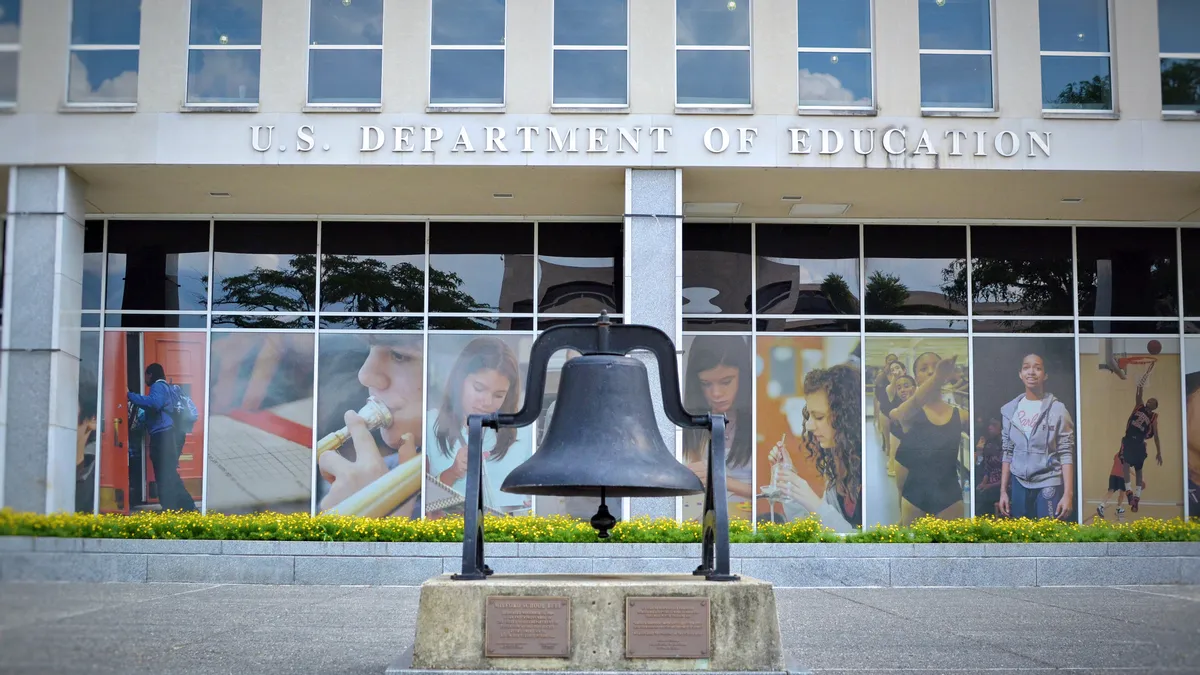The U.S. Department of Education unveiled several regulatory proposals Tuesday around accreditation, distance education and state authorization ahead of policy negotiations next week.
The proposals are in part intended to ensure that accreditors and state authorizing agencies are adequately monitoring the colleges under their purview, the Education Department said in an announcement. They’re also meant to make it easier for students to access federal financial aid.
“These efforts are another step in improving the higher education system and ensuring colleges are providing all students with high-quality opportunities for upward social and economic mobility,” U.S. Under Secretary of Education James Kvaal said in a statement.
The Education Department’s proposals highlight the Biden administration’s priorities as the agency reworks vast swathes of higher education policy. The agency’s pitches will kick off discussions beginning Jan. 8, when negotiators representing different stakeholder groups — including colleges, student borrowers and financial aid staff — will meet to hash out potential changes.
If the negotiators agree on new policy language, the Education Department must adopt it when proposing new regulations. If they don’t reach consensus, however, the agency is free to write its own rules.
The Education Department plans to release draft regulations for accreditation and other policies in October. Other regulations under review include those governing Title IV aid management and eligibility for federal TRIO programs, which serve disadvantaged students.
Are changes coming to accreditation?
The latest round of policy proposals focuses partly on accrediting agencies, the gatekeepers of billions of federal financial aid. Without their seal of approval, colleges can’t provide their students with federal student loans, Pell Grants and other types of Title IV aid.
One proposed change would require accreditors to take action more quickly when colleges aren’t complying with their guidelines.
Accreditors have long faced accusations that they don’t move quickly enough to strip their approval from institutions with poor student outcomes or that face risk of closing.
The Education Department is seeking to limit how long colleges can be out of compliance with their accreditors.
The proposed cap — either two years or the length of the college's longest program, whichever is shorter — wouldn’t apply to compliance failures related to student achievement. That’s because it may take longer for colleges to improve these metrics, according to a paper outlining the proposals.
Another proposal would revamp how the agency assesses accreditors.
The department pitched a system to more regularly review accreditors that it deems to be high risk. The department also plans to discuss how it should evaluate the rigor of accrediting agencies’ standards, including benchmarks for student achievement, fiscal capacity, and recruiting and admissions practices.
Education Department eyes state authorization changes
The new proposals also focus on state authorization. States must greenlight colleges to operate within their borders — a key step before institutions can receive federal financial aid.
States can also enter reciprocity agreements with each other. These allow online colleges to offer programs to students in participating states without seeking state-by-state authorization.
Although these agreements ease administrative burdens for distance education providers, the Education Department said it’s concerned they reduce state oversight of colleges and fail to protect students.
“Additionally, we are concerned that some States are deferring all, or nearly all, of their oversight responsibilities to other States and the governing bodies that oversee these agreements for approval,” the Education Department said.
In its policy proposals, the Education Department took aim at the National Council for State Authorization Reciprocity Agreements, or NC-SARA, an organization that oversees a key distance learning pact involving every state except California.
The agency noted that NC-SARA’s board doesn’t just include representatives from states, but also those for accrediting agencies and colleges. Board members have veto power over any proposed policy changes.
The department argued that this means that state authorization is being overseen by “entities other than just States, including the regulated institutions the agreements are supposed to govern.”
The Education Department proposed that organizations overseeing online learning pacts, such as NC-SARA, have governing boards composed entirely of state employees and members of the public. College representatives would be barred from serving on these boards.
The agency also pitched requiring reciprocity agreements to mandate that colleges have systems for students to file complaints to their home states.
Marianne Boeke, president of NC-SARA, said via email Wednesday that the organization is working with its board members to review the Education Department’s proposals and will listen to the negotiators discuss potential policy changes next week.






















